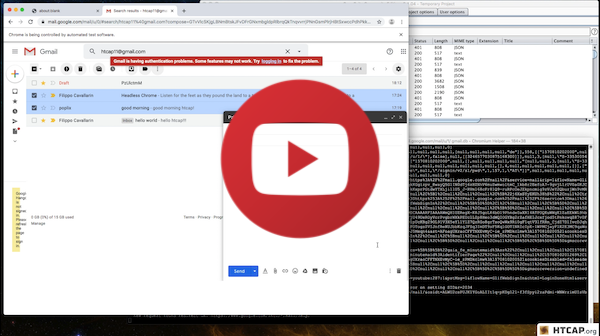htcap is a web application scanner able to crawl single page application (SPA) recursively by intercepting ajax calls and DOM changes.
HTCAP
htcap is a web application scanner able to crawl single page application (SPA) recursively by intercepting ajax calls and DOM changes.
KEY FEATURES
- Recursive DOM crawling engine
- Discovers ajax/fetch/jsonp/websocket requests
- Supports cookies, proxy, custom headers, http auth and more
- Heuristic page deduplication engine based on text similarities
- Scriptable login sequences
- All findings are saved to sqlite database and can be exported to an interactive html report
- The built-in fuzzers can detect SQL-Injection, XSS, Command Execution, File disclosure and many more
- Can be easly interfaced with Sqlmap, Arachni, Wapiti, Burp and many other tools
- Fuzzers are built on top of a fuzzing framework so they can be easly created/customized
- Fuzzers fully support REST and SOAP payloads (json and xml)
- Both crawler and fuzzers run in a mulithreaded environment
- The report comes with advanced filtering capabilities and workflow tools
BRIEF
Htcap is not just another vulnerability scanner since it’s focused on the crawling process and it’s aimed to detect and intercept ajax/fetch calls, websockets, jsonp ecc. It uses its own fuzzers plus a set of external tools to discover vulnerabilities and it’s designed to be a tool for both manual and automated penetration test of modern web applications.
It also features a small but powerful framework to quickly develop custom fuzzers with less than 60 lines of python.
The fuzzers can work with GET/POST data, XML and JSON payloads and switch between POST and GET. Of course, fuzzers run in parallel in a multi-threaded environment.
This is the very first release that uses headless chrome instead of phantomjs.
Htcap’s Javascript crawling engine has been rewritten to take advantage of the new async/await features of ecmascript and has been converted to a nodjes module build on top of Puppetteer.
More infos here.
DEMO
The video below shows htcap crawling gmail.
The crawl lasted for many hours and about 3000 XHR request have been captured.
SETUP
Requirements
- Python 3.3
- Nodejs and npm
- Sqlmap (for sqlmap scanner module)
- Arachni (for arachni scanner module)
Local Installation
Install the requirements and run the following:
$ git clone https://github.com/fcavallarin/htcap.git htcap
$ htcap/htcap.py
Docker Installation
Install Docker and run the following:
$ git clone https://github.com/fcavallarin/htcap.git htcap
$ cd htcap
$ docker build -t htcap --build-arg HTCAP_VERSION=master . # replace master by the desired htcap commit hash or branch
$ mkdir -p htcap-out && docker run -v "$(pwd)/htcap-out/":/out/ --rm --name htcap htcap
$ docker exec -it htcap bash
$ htcap # now you can use htcap in the Docker container
You can access services listening on the Docker host from within the Docker container using the hostname host.docker.internal.
To get the IP for host.docker.internal, run the following command inside the Docker container:
getent hosts host.docker.internal | awk '{print $1;}'
DOCUMENTATION
Documentation, examples and demos can be found here
LICENSE
This program is free software; you can redistribute it and/or modify it under the terms of the GNU General Public License as published by the Free Software Foundation; either version 2 of the License, or(at your option) any later version.
